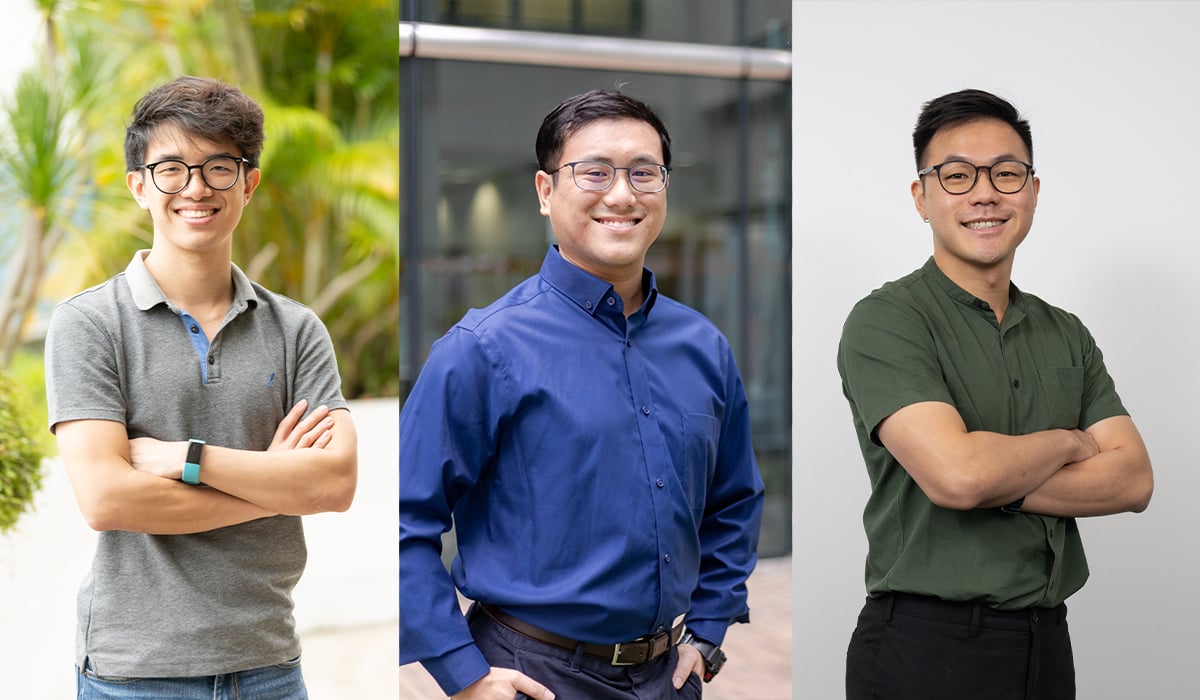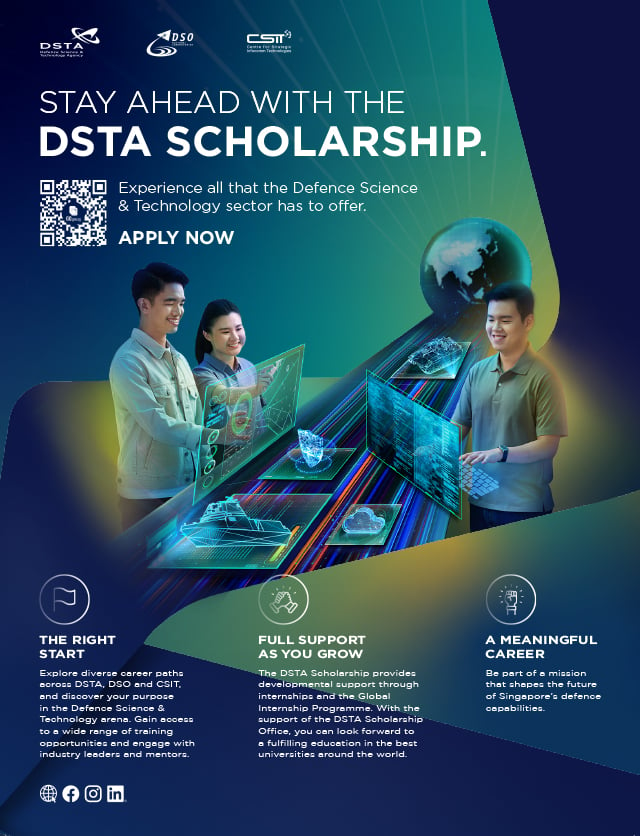Left: Ong Chin Han completed his Master of Engineering (Electrical and Information Science) from the University of Cambridge in England after receiving the DSTA Scholarship. He is now an Engineer in the Advanced Systems Programme Centre at DSTA.
Middle: Soon Wei Jun was awarded the DSTA Scholarship and graduated from NUS with a Bachelor of Engineering (Computer Engineering) with Honours (Distinction). He went on to obtain a Master of Science (Information Security) from the University College London. Today, he works at CSIT as a Cyber Security Engineer.
Right: Phoong Khang Zhie is currently a Machine Learning Researcher at DSO. He graduated with a Bachelor of Science in Computer Science from The University of Washington in the USA and is a recipient of the DSTA Scholarship.
Singapore’s defence science and technology sector plays a crucial role in bolstering the nation’s strategic defence capabilities and driving technological advancements. To ensure national security, the Defence Science and Technology Agency (DSTA) has been established as the primary organisation responsible for driving innovation and delivering state-of-the-art capabilities to make the Singapore Armed Forces (SAF) a formidable fighting force.
The DSTA Scholarship presents exceptional students with a unique opportunity to embark on fulfilling careers in this field. Scholars will be able to explore exciting work prospects with organisations such as DSTA, DSO National Laboratories (DSO) and Centre for Strategic Infocomm Technologies (CSIT).
DSTA Scholars Ong Chin Han, Phoong Khang Zhie, and Soon Wei Jun are passionate individuals dedicated to contributing to our nation’s defence capabilities under the comprehensive guidance of their organisation.
Chin Han is an Engineer in the Advanced Systems Division of DSTA, ensuring the seamless integration of sensors as integral components of SAF’s systems. Khang Zhie is a Machine Learning Researcher at DSO where he conducts research in Natural Language Processing (NLP) to develop innovative solutions to enhance our national defences. Lastly, Wei Jun works as a Cyber Security Engineer at CSIT and is actively involved in the research, development, and implementation of tools that fortify Singapore’s cybersecurity.
We learn about the valuable work that they do and hear about their exciting career journeys.
What sparked your interest in your respective fields?
Chin Han: I like to learn how things function, and using this knowledge, see how it can be applied for other purposes. I also like problem-solving, which is a cornerstone of engineering.
Khang Zhie: I was first introduced to machine learning and NLP at university. My professor for the NLP module inspired me with his passion for the field through his stories and experiences. Through the module, I saw the exciting possibilities and challenges within NLP and the potential impact of NLP in solving real-world problems. As such, I decided to enter the field of machine learning and NLP and contribute to our nation’s defence in this aspect.
Wei Jun: My journey to becoming a Cybersecurity Engineer started when I became interested in coding after taking computer science modules and joining the Robotics Club in secondary school. However, what truly sparked my interest in cybersecurity was my internship with CSIT. My internship project was on telecommunications security and being able to experience and work with some of the cybersecurity experts in CSIT ignited my passion in the area.
That makes a lot of sense! Why did you choose to pursue the DSTA Scholarship over other options?
Chin Han: The DSTA Scholarship encompasses everything I was looking for in terms of interests, learning opportunities, career development and being able to make a meaningful impact through my work contributions. The DSTA Scholarship is also one of the few scholarships in Singapore with a focus on engineering and computer science, which was something I wanted to major in.
In addition, the scholarship offers a comprehensive programme that not only supported my academic pursuits but also provided overseas exposure and internships as well as mentorship and networking opportunities. Lastly, the scholarship carries a sense of purpose - working in a top-notch technology organisation like DSTA enables me to harness cutting-edge tech to contribute to Singapore’s defence and security.
Khang Zhie: During one of the scholarship fairs, I spoke to people at both the DSTA and DSO booths who shared that their work was not only technically challenging but also meaningful as it contributed to our nation’s defence. This was the kind of exciting work I was looking for so I decided to apply for the DSTA Scholarship. I had the opportunity to try my hand at research while I was in university, and that experience taught me that research went beyond runningexperiments and publishing research papers – it is also about pushing the boundaries by taking risks that others might not.
This ignited my passion for research work and led me to pursue a research-focused career with DSO. As Singapore’s largest defence research & development organisation, DSO was where I knew I would be involved in research that drives innovation and develops technological solutions to sharpen the cutting edge of Singapore’s defence and national security.
Wei Jun: I was always keen to work in the defence tech sector as I wanted a career that could realise my interest in cybersecurity while working for a meaningful objective, such as contributing to national defence. I decided to apply for the DSTA Scholarship as it offered me opportunities to broaden my horizons to better understand what it means to work in the defence tech sector, and to gain valuable experience through the overseas student exchange programme.
Additionally, I had the opportunity to intern with both CSIT and DSTA, which gave me valuable work experience and a deeper understanding of the unique characteristics of both organisations. I ultimately chose CSIT as I wanted to pursue a career that allowed me to delve into the deep technical work that comes with cybersecurity.
Can you tell us more about your roles and responsibilities? What is a typical workday like?
Chin Han: I am an Engineer in the Electro Optics (EO) cluster in DSTA’s Advanced Systems Programme Centre, where I acquire and integrate advanced imagery sensors for the Singapore Armed Forces (SAF). I deal with optics and semiconductor technologies, and integration activities to ensure a seamless integration of sensors as a functioning module of SAF systems. I have the opportunity to work closely with other DSTA engineers, stakeholders and subject matter experts to deliver leading-edge capabilities to the SAF.
Khang Zhie: I am a Machine Learning Researcher from the Information Division’s Information Exploitation Lab. Specialising in natural language processing, my role involves developing innovative NLP models and algorithms and applying them to solve challenging problems in defence and security domains.
A typical workday involves a combination of activities such as reading research papers, coding, and implementing algorithms tailored to the unique requirements of defence applications. I also allocate time for self-learning where I explore new tools and libraries and stay updated with the latest trends and techniques in NLP.
Wei Jun: As a Cybersecurity Engineer at CSIT, my role is to protect Singapore’s security in the cyber domain. Since my focus area is mobile security, a typical workday for me would consist of working with my team to analyse commonly used mobile apps for any vulnerabilities that could be exploited by attackers. Due to the dynamic threat landscape where new cyber threats regularly emerge, we also have to continuously keep ourselves updated on the latest mobile threats. Such knowledge can better enable us to develop tools and methods to prevent breaches from happening.
Your work sounds fascinating. What do you personally find most meaningful about it?
Chin Han: I find it meaningful to contribute to public service and to Singapore as a nation.
Khang Zhie: My work in NLP allows me to contribute to the development of new and innovative approaches to detecting and countering threats, which can help enhance our national security. By leveraging NLP advancements, I can help to improve intelligenceanalysis, information retrieval, and decision-making processes within the defence sector by analysing and understanding large volumes of text and speech data. Knowing that my work has a direct impact on safeguarding the country and its citizens is most meaningful to me.
Wei Jun: The most meaningful aspect of my work is in ensuring that potential malicious attackers cannot easily breach our systems. Knowing that my work has a direct contribution to Singapore’s security gives me a great sense of satisfaction and reinforces my passion for what I do.
Chin Han, what would you say is your most significant career achievement so far?
Chin Han: Seeing the EO systems I’ve worked on as a member of the project team in person, and the sense of elation and relief as we complete each milestone that brings the system closer to operation are particularly proud memories. Project management is a complex process with multiple milestones and navigating projects through challenging milestones gives me a great sense of accomplishment and satisfaction.
These experiences have also aided my professional growth tremendously. I was able to pick up new technical skills such as cybersecurity and systems integration and learnt how to better manage my time between parallel tasks.
Finally, what do you hope to achieve in your career?
Chin Han: I hope to be able to develop my technical competency and leadership qualities, and subsequently, contribute to the defence technology community from a strategic perspective.
Khang Zhie: The possibilities are endless with NLP! On the technical front, I hope to develop an NLP system that can augment decision-making and strategic planning by learning insights from historical data. At a social level, I aspire to build systems that are accessible to all so that the applications of NLP can make a difference in our daily lives in a practical way. Through my research, I also hope to be able to develop new and innovative methods that help with the advancement of machine learning and NLP research.
Wei Jun: I aim to hone my technical skills and develop my career as a technical specialist so that I can continue making meaningful contributions to Singapore’s national security in the cyberspace domain.



